Honour of Annaly - Feudal Principality & Seignory Est. 1172
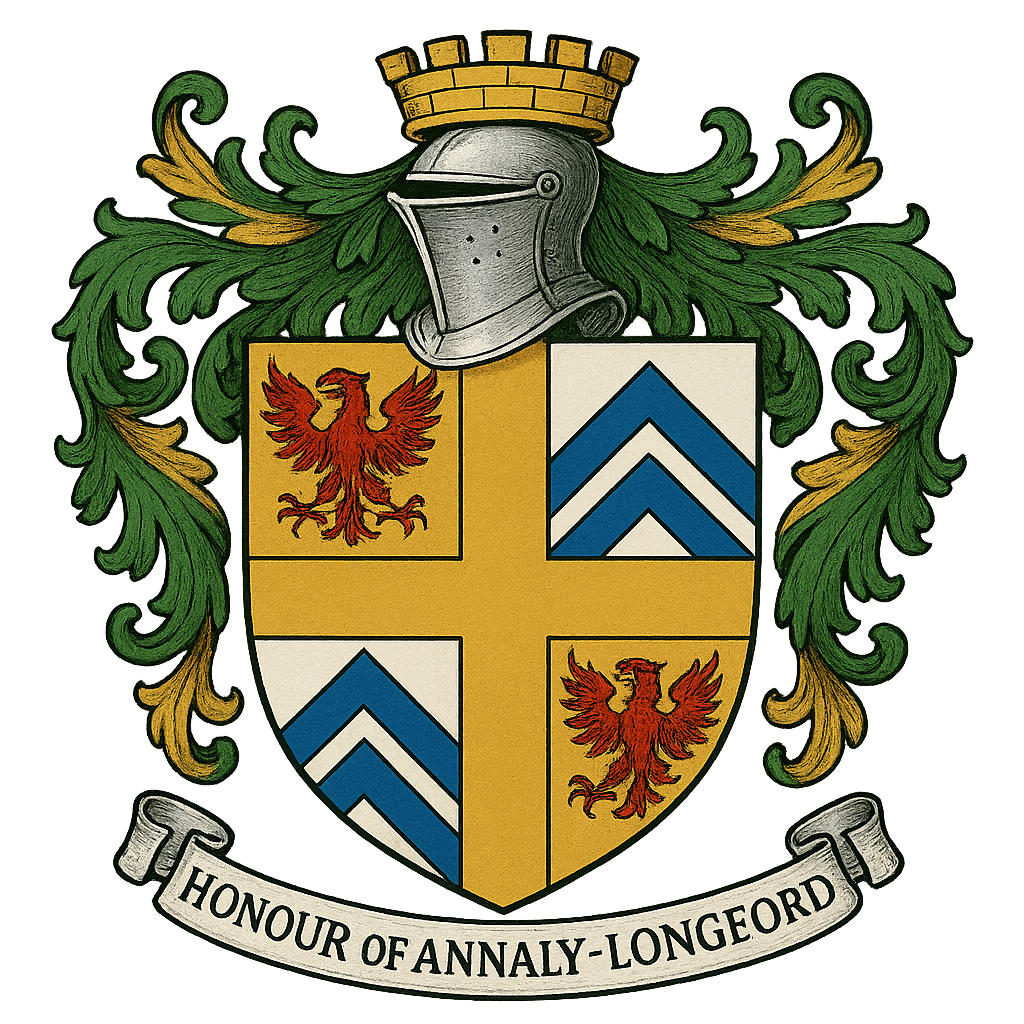
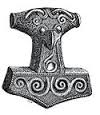



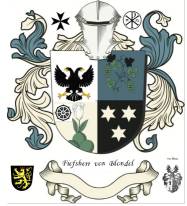
|
Feudal Baronies – Origins and NatureFeudal baronies in Ireland and Scotland emerged from the broader Norman feudal system, introduced after the Norman Conquest (1066 in England, later extended to Ireland and Scotland).
Creation and Descent of BaroniesEnglish law recognized three ways to create an honour or dignity:
In Ireland:
Feudal Barons in Ireland
Feudal Baronies in Scotland
Legal and Historical Legacy
⚜️ Prince of Annaly Teffia - Summary of the Feudal Rights and DignitiesFeudal Principality and Seignory of Annaly (Longford), Ireland (Ancient Teffia )I. Legal Foundation and Conveyance (Modern Title 2018) II. Nature of the Rights Conveyed
III. Historical Seats and Principal Grants Forming the Principality
These collectively form a composite feudal principality encompassing all the ancient kingdoms of Annaly, Cairpre Gabra, Teffia, and Conmaicne Rein, united under the palatine authority of the Barons Delvin. IV. Dynastic Continuity
V. Prerogatives and Interpretations under Law
VI. Modern Status and Style
VII. Genealogical and Cultural Context VIII. Summary of Legal Effect
In Essence:
Feudal Barons of Ireland or ScotlandFor a primer on Feudal Irish Baronies, see House of Lords According to the principles of the English law, Honours can only have been created in three ways, by tenure, by writ, or by patent. An attempt may be made here to show that there is an analogy between the ancient feudal baronies and the baronies that have since been created in Ireland, and that all feudal baronies went to the heirs male, and therefore, although the feudal principle has ceased, still all those baronies are confined in their descent to the heirs male. We assert that no feudal baronies of Ireland have ever been confined in their descent to heirs male. There exist, from the reign of John, grants of land, held in capite of the Crown, and iu every case the grant has [48] been to the grantee and his heirs. There can be no dcubt that at the time of the signing of Magna C arta, Baron Fitz-Walter and Baron Say, and some others, were barons by tenure; but when claims have been made to those baronies, this House has uniformly treated them as the first writs of summons, and heirs general of those barons have frequently succeeded to them; all the earldoms in Ireland before the year 1316 were granted to the heirs of the parties, so that there is not till that year, before which period the Barony of Slane was created by writ of summons, a single dignity in Ireland which descended to heirs male only. All the early patents of the English peerage have been printed, and the result is that the first time heirs male were ever mentioned in the creation of any dignity, was in the instance of the Earldom of Kildare in 1316. The next was that of Louth in the 12th Edw. 2d, and the third that of the Earldom of Carlisle, in the 15th Edw. 2d. The first creation of a baron by patent in England was in 1387, which was also the first instance in England of a barony being created to a man and the heirs of his body. No second instance occurred till 1443. No creation of a baron in Ireland by patent is on record limiting the dignity to the heirs male of the body, until the 2d of Edw. 4th, in 1462, when Sir Robert Barnwall was created. From the Crown downwards, every dignity, from an early period, was granted to the heirs of the persons created, or the heirs of the body. The Barons of Delvin of Westmeath-Longford) were summoned to Parliament on various occasions. Connor, who was King of Meath, and the ancestor of Cuniffe. According to O'Dugan, this Connor was the ancestor of Nugent, Earls of Westmeath.
The original and antiquity of baronies has occasioned great inquiries among our English antiquaries. The most probable opinion seems to be, that they were the same with our present lords of manors, to which the name of court baron (which is the lord's court, and incident to every manor) gives some countenance. (11) It may be collected from king John's magna carta, (k) that originally all lords of manors, or barons, that held of the king in capite, had seats in the great council or parliament; till about the reign of that prince the conflux of them became so large and troublesome, that the king was obliged to divide them, and summon only the greater barons in person, leaving the small ones to be summoned by the sheriff, and, as it is said, to sit by representation in another house, which gave rise to the separation of the two houses of parliament. (/) By degrees the title came to be confined to the greater barons, or lords of parliament only; and there were no other barons among the peerage but such as were summoned by writ, in respect of the tenure of their lands or baronies, till Richard the Second first made it a mere title of honor, by conferring it on divers persons by his letters-patent, (tn) Cite
In the 13th Century in England the barons ceased to be peers, unless so created, but in Scotland, up to the year 1587,—in which year, various acts, drawn up by Lord Menmuir [see article BALCARREs, ante, p. 199] were passed for regulating the form and order of parliament and the vote of the barons,—the title of baron was common to all the landed proprietors or lairds, holding their lands directly of the Crown. The feudal system was introduced into England by the Norman Conquest. Its pressure on the common people was aggravated by the completeness of the subjection of the Saxon race. All the land was held by feudal tenure, and there was no allodium. The few Saxons who were permitted to retain their lands were brought under the feudal system; and the thanes were reduced to the condition of franklins, or simple freeholders. The Normans, who held most of the manors from the king, were called tenants-in-chief (in capite); and they were bound to knight service—that is, to maintain in the field, for forty days at a time, a certain force of their subtenants. This service extended to religious foundations and monasteries. Exclusive of these, 1400 tenants-in-chief and about 8000 mesne lords (holding fiefs not directly from the crown) are enumerated in Domesday Book. | ||||||||||||||||||||||||||||||||||||||||||||||||||||||
About Longford Feudal Prince House of Annaly Teffia Rarest of All Noble Grants in European History Statutory Declaration by Earl Westmeath Kingdoms of County Longford Pedigree of Longford Annaly What is the Honor of Annaly The Seigneur Lords Paramount Ireland Market & Fair Chief of The Annaly One of a Kind Title Lord Governor of Annaly Prince of Annaly Tuath Principality Feudal Kingdom Irish Princes before English Dukes & Barons Fons Honorum Seats of the Kingdoms Clans of Longford Region History Chronology of Annaly Longford Hereditaments Captainship of Ireland Princes of Longford News Parliament 850 Years Titles of Annaly Irish Free State 1172-1916 Feudal Princes 1556 Habsburg Grant and Princely Title Rathline and Cashel Kingdom The Last Irish Kingdom Landesherrschaft King Edward VI - Grant of Annaly Granard Spritual Rights of Honour of Annaly Principality of Cairbre-Gabhra House of Annaly Teffia 1400 Years Old Count of the Palatine of Meath Irish Property Law Manors Castles and Church Lands A Barony Explained Moiety of Barony of Delvin Spiritual & Temporal Islands of The Honour of Annaly Longford Blood Dynastic Burke's Debrett's Peerage Recognitions Water Rights Annaly Writs to Parliament Irish Nobility Law Moiety of Ardagh Dual Grant from King Philip of Spain Rights of Lords & Barons Princes of Annaly Pedigree Abbeys of Longford Styles and Dignities Ireland Feudal Titles Versus France & Germany Austria Sovereign Title Succession Mediatized Prince of Ireland Grants to Delvin Lord of St. Brigit's Longford Abbey Est. 1578 Feudal Barons Water & Fishing Rights Ancient Castles and Ruins Abbey Lara Honorifics and Designations Kingdom of Meath Feudal Westmeath Seneschal of Meath Lord of the Pale Irish Gods The Feudal System Baron Delvin Kings of Hy Niall Colmanians Irish Kingdoms Order of St. Columba Chief Captain Kings Forces Commissioners of the Peace Tenures Abolition Act 1662 - Rights to Sit in Parliament Contact Law of Ireland List of Townlands of Longford Annaly English Pale Court Barons Lordships of Granard Irish Feudal Law Datuk Seri Baliwick of Ennerdale Moneylagen Lord Baron Longford Baron de Delvyn Longford Map Lord Baron of Delvin Baron of Temple-Michael Baron of Annaly Kingdom Annaly Lord Conmaicne Baron Annaly Order of Saint Patrick Baron Lerha Granard Baron AbbeyLara Baronies of Longford Princes of Conmhaícne Angaile or Muintir Angaile Baron Lisnanagh or Lissaghanedan Baron Moyashel Baron Rathline Baron Inchcleraun HOLY ISLAND Quaker Island Longoford CO Abbey of All Saints Kingdom of Uí Maine Baron Dungannon Baron Monilagan - Babington Lord Liserdawle Castle Baron Columbkille Kingdom of Breifne or Breny Baron Kilthorne Baron Granarde Count of Killasonna Baron Skryne Baron Cairbre-Gabhra AbbeyShrule Events Castle Site Map Disclaimer Irish Property Rights Indigeneous Clans Dictionary Maps Honorable Colonel Mentz Valuation of Principality & Barony of Annaly Longford“The Princely House of Annaly–Teffia is a territorial and dynastic house of approximately 1,500 years’ antiquity, originating in the Gaelic kingship of Teffia and preserved through the continuous identity, property law, international law, and inheritance of its lands, irrespective of changes in political sovereignty.”
Feudal Baron of Longford Annaly - Baron Longford Delvin Lord Baron &
Freiherr of Longford Annaly Feudal Barony Principality Count Kingdom of Meath - Feudal Lord of the Fief
Blondel of the Nordic Channel Islands Guernsey Est. 1179 George Mentz
Bio -
George Mentz Noble Title -
George Mentz Ambassador - Order of the Genet
Knighthood Feudalherr - Fief Blondel von der Nordischen
Insel Guernsey Est. 1179 * New York Gazette ®
- Magazine of Wall Street - George
Mentz - George
Mentz - Aspen Commission - Ennerdale - Stoborough - ESG
Commission - Ethnic Lives Matter
- Chartered Financial Manager -
George Mentz
Economist -
George Mentz Ambassador -
George Mentz - George Mentz Celebrity -
George Mentz Speaker - George Mentz Audio Books - George Mentz Courses - George Mentz Celebrity Speaker Wealth
Management -
Counselor George Mentz Esq. - Seigneur Feif Blondel - Lord Baron
Longford Annaly Westmeath
www.BaronLongford.com * www.FiefBlondel.com |
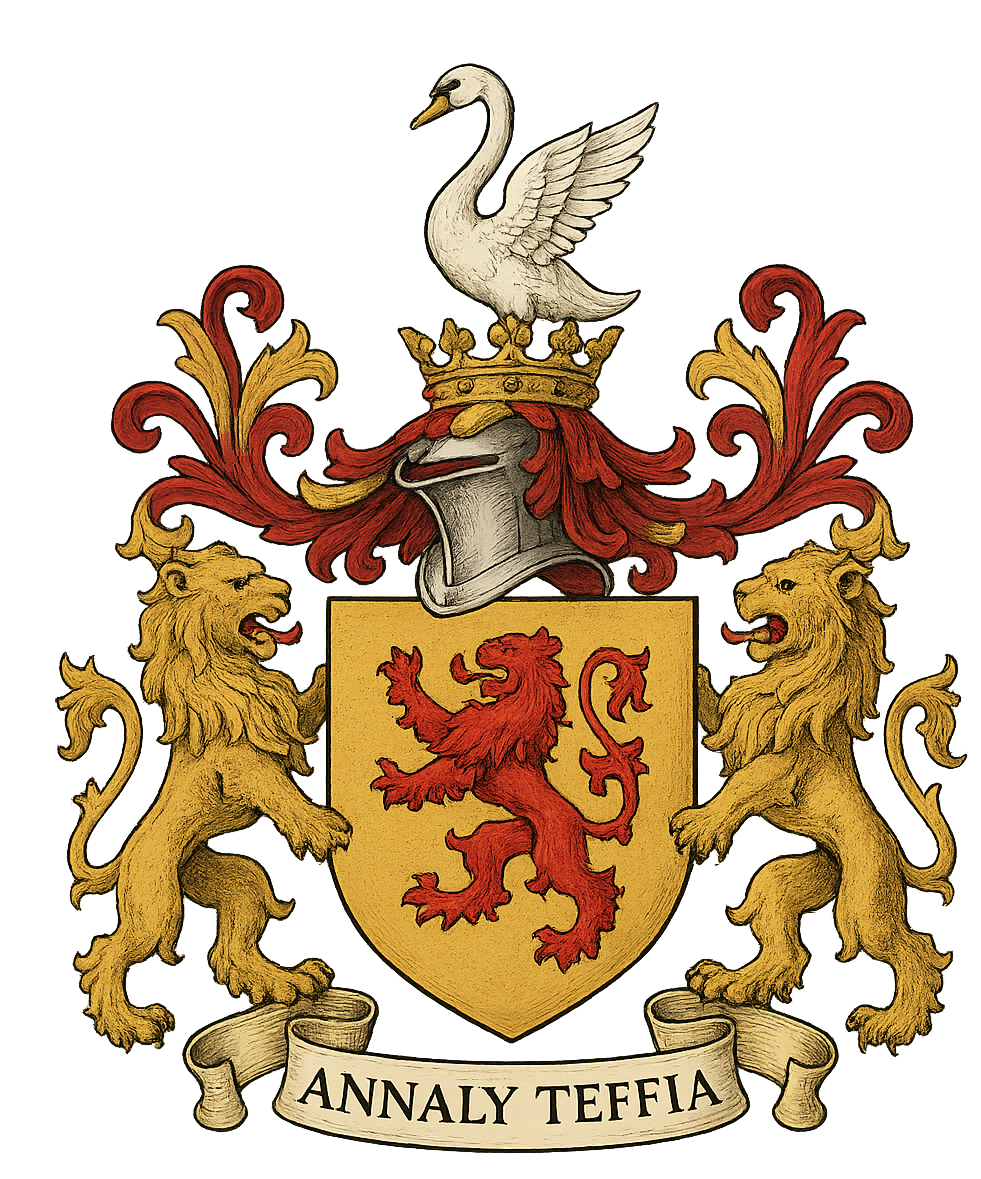
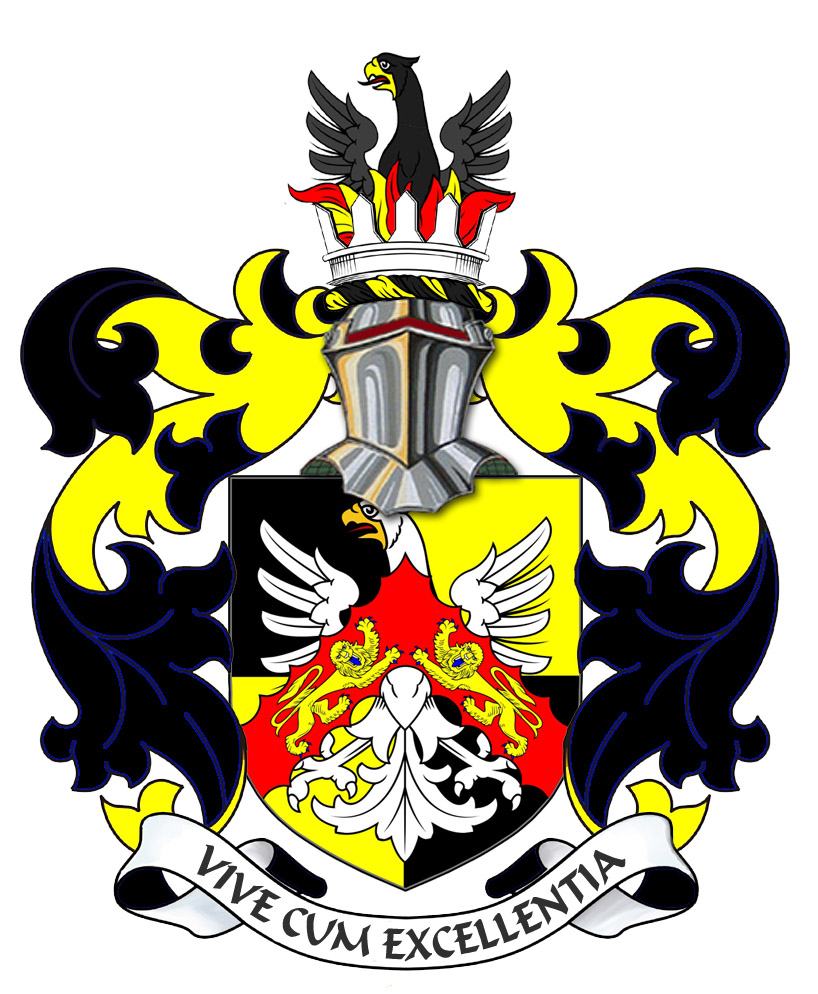
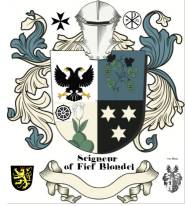


Commissioner George Mentz - George
Mentz Law Professor - George
Mentz Economist
George Mentz News -
George Mentz Illuminati Historian -
George Mentz Net Worth
The Globe and Mail George Mentz
Get Certifications in Finance and Banking to Have Career Growth | AP News

